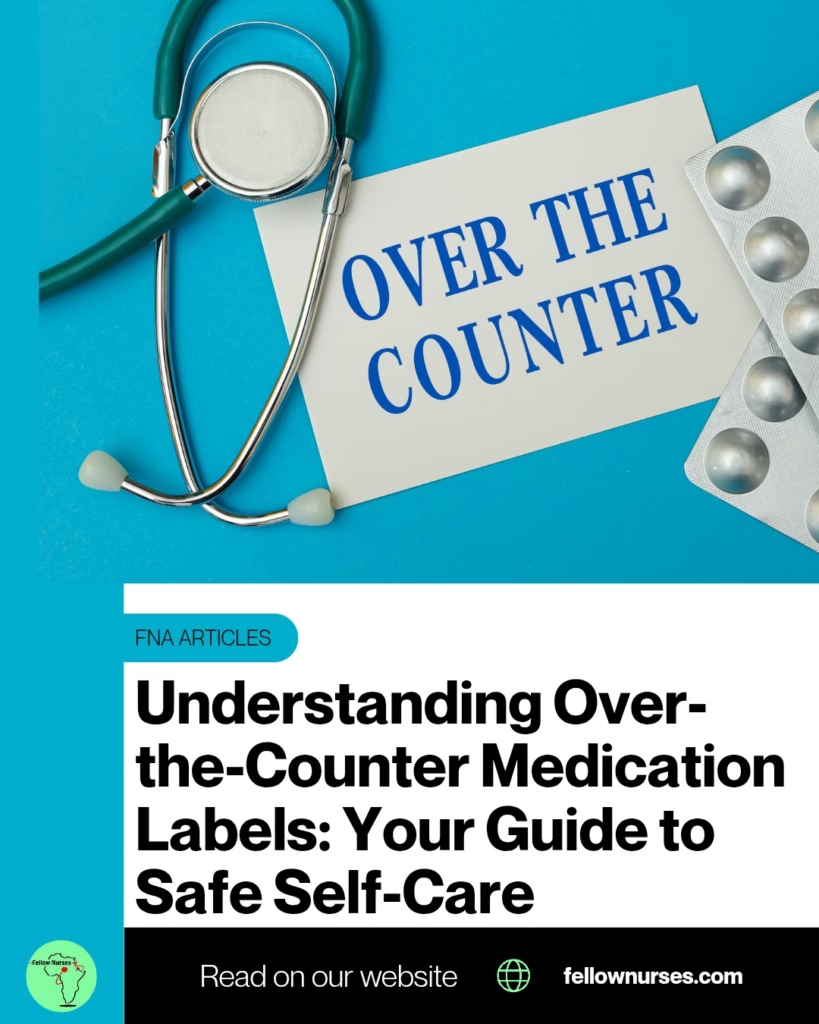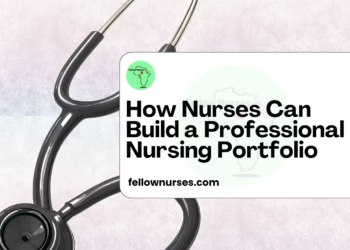Fellow Nurses Africa | Lagos, Nigeria | 17 September 2025

When you walk down the pharmacy aisle, shelves lined with over-the-counter (OTC) medications can feel overwhelming. From pain relievers to allergy medications, these products promise relief for common ailments. However, the key to using them safely and effectively lies in understanding what’s written on their labels. Learning to decode medication labels isn’t just helpful, it’s essential for your health and safety.
The Drug Facts Label
Every OTC medication sold must display a standardized “Drug Facts” label, similar to nutrition labels on food products. This label follows a specific format mandated by the FDA, making it easier to find the information you need quickly.
Active Ingredient
At the top of the Drug Facts label, you’ll find the active ingredients section. This tells you exactly what chemical compounds are doing the work in your medication. For example, acetaminophen is the active ingredient in Tylenol.
Understanding active ingredients helps you avoid accidentally taking the same medication twice.
Purpose and Uses: What the Medicine Treats
The “Uses” section clearly states what symptoms or conditions the medication is designed to treat. This might include “temporarily reduces fever,” “relieves minor aches and pains,” or “suppresses cough.” This section helps ensure you’re choosing the right medication for your specific symptoms.
Pay attention to the word “temporarily” that appears frequently. OTC medications are designed for short-term relief, not long-term treatment of chronic conditions. If your symptoms persist beyond the timeframe indicated, it’s time to consult a healthcare professional.
Dosage Instructions
Perhaps the most critical section is the dosage information. This tells you how much to take, how often to take it, and the maximum amount allowed in a 24-hour period. Dosing is typically broken down by age groups, with specific instructions for adults, children, and sometimes infants.
Never exceed the recommended dose or frequency. Taking more doesn’t provide better relief and can lead to serious side effects or overdose. If the recommended dose isn’t providing adequate relief, consult a healthcare provider rather than increasing the amount on your own.
Warnings
The warnings section contains vital safety information that could prevent serious health complications. This includes who should not use the medication, potential side effects, and circumstances that require medical supervision.
Common warnings include avoiding certain medications if you have liver disease, kidney problems, or are taking blood thinners. Pregnancy and breastfeeding warnings are also included here. Some medications warn against use with alcohol or while operating machinery.
Inactive Ingredients: More Important Than You Think
Below the Drug Facts panel, you’ll find a list of inactive ingredients. While these don’t provide the therapeutic effect, they’re crucial for people with allergies or dietary restrictions. Inactive ingredients might include dyes, preservatives, flavorings, or binding agents.
If you have allergies to specific compounds, always check this list. For example, some medications contain lactose, which could affect those with lactose intolerance, while others might contain gluten or specific dyes that trigger allergic reactions.
Age-Appropriate Dosing
Pay careful attention to age restrictions. Some medications are not safe for children under certain ages. Aspirin, for example, should not be given to children or teenagers due to the risk of Reye’s syndrome. When in doubt about appropriate medications for children, consult a pediatrician or pharmacist.
Drug Interactions
While the label provides some interaction warnings, it cannot cover every possible combination. If you take prescription medications or have chronic health conditions, discuss OTC medication use with your healthcare provider or pharmacist. They can identify potential interactions that might not be obvious from the label alone.
Expiration Dates
Always check expiration dates before taking any medication. Expired medications may be less effective or, in rare cases, harmful. Store medications according to label instructions to maintain their potency and safety.
When to Seek Professional Help
OTC medication labels include guidance on when to stop using the product and seek medical attention. Generally, you should consult a healthcare provider if:
- Symptoms worsen or don’t improve within the timeframe specified on the label
- You experience unexpected side effects
- You need to use the medication longer than recommended
- You’re unsure about interactions with other medications or health conditions
Remember that OTC doesn’t mean risk-free. These medications are powerful tools for managing minor health issues, but they require the same respect and careful use as prescription drugs.
The next time you reach for that bottle of pain reliever or allergy medication, take a moment to read the label thoroughly.
Fellow Nurses Africa is the independent voice of African Nurses. We educate, inform and support the nursing profession.










